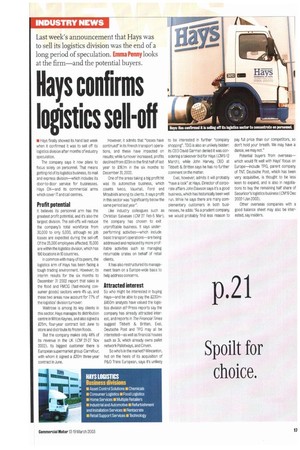Hays confirms logistics sell-off
Page 17

If you've noticed an error in this article please click here to report it so we can fix it.
• Hays finally showed its hand last week when it confirmed it was to sell off its logistics division after months of industry speculation.
The company says it now plans to focus solely on personnel. That means getting rid of its logistics business, its mail and express division—which includes its door-to-door service for businesses, Hays DX—and its commercial arms which cover IT and call centres.
Profit potential
It believes its personnel arm has the greatest profit potential, and it's also the largest division. The sell-offs will reduce the company's total workforce from 30,000 to only 5,000, although no job losses are expected during the sell-off. Of the 25,000 employees affected,15,000 are within the logistics division, which has 190 locations in 10 countries.
In common with many of its peers, the logistics arm of Hays has been facing a tough trading environment. However, its interim results for the six months to December 31 2002 report that sales in the food and FMCG (fast-moving consumer goods) sectors were 4% up, and these two areas now account for 77% of the logistics' division turnover.
Waitrose is among its key clients in this sector. Hays manages its distribution centre in Milton Keynes, and also signed a 125m, four-year contract last June to store and distribute its frozen foods.
But the company makes only 48% of its revenue in the UK (CM 21-27 Nov 2002). Its biggest customer there is European supermarket group Carrefour, with whom it signed a 120m three-year contract in June. However, it admits that losses have continued" in its French transport operations, and these have impacted on results; while turnover increased, profits declined from 1.23m in the first half of last year to £18.1m in the six months to December 31,2002.
One of the areas taking a big profit hit was its automotive business, which counts Iveco, Vauxhall, Ford and Mitsubishi among its clients. It says profit in this sector was "significantly below the same period last year".
Like industry colleagues such as Christian Salvesen ( CM 27 Feb-5 Mar), the company has chosen to exit unprofitable business, It says underperforming activities—which include basic transport operations—are being addressed and replaced by more profitable activities such as managing returnable crates on behalf of retail clients.
It has also restructured its management team on a Europe-wide basis to help address concerns.
Attracted interest
So who might be interested in buying Hays—and be able to pay the 1,230m1,450m analysts have valued the logistics division at? Press reports say the company has already attracted interest, and reports in The Financial Times suggest Tibbett &, Britten. Exel, Deutsche Post and TPG may all be interested—as well as financial houses such as 31, which already owns pallet network Palletways, and Cinven.
So who's in the market? Wincanton, hot an the heels of its acquisition of P&O Trans European, says it's unlikely to be interested in further "company shopping. TDG is also an unlikely bidder: its CEO David Garman denied it was considering a takeover bid for Hays (CM 6-12 March), while John Harvey, CEO at Tibbett & Britten says he has no further comment on the matter.
Exel, however, admits it will probably have a look" at Hays. Director of corporate affairs John Dawson says it's a good business, which has historically been well run. While he says there are many complementary customers in both businesses, he adds: As a prudent company, we would probably find less reason to pay full price than our competitors, so don't hold your breath. We may have a dance, we may not."
Potential buyers from overseas— which would fit well with Hays' focus on Europe—include TPG, parent company of TNT. Deutsche Post, which has been very acquisitive, is thought to be less keen to expand, and is also in negotiations to buy the remaining half share of Securicor's logistics business (CM19 Dec 2002-1Jan 2003).
Other overseas companies with a good balance sheet may also be interested, say insiders.
































































































































































































































